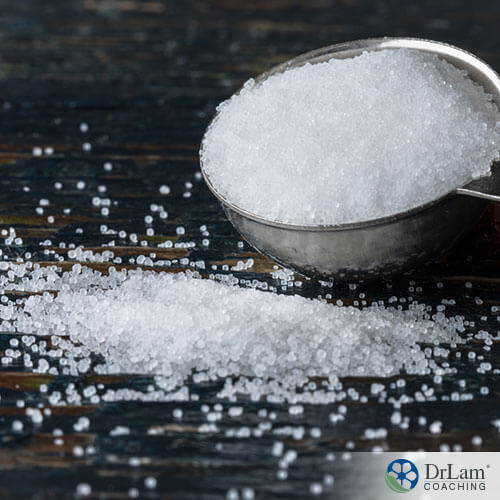 Iodine is one of the essential trace elements that your body needs for proper functioning. Seafood, raw milk products, and eggs are a good source of the nutrient, but if you don’t eat much of these foods or eat foods grown in iodine-deficient soil, the easiest way to get enough iodine in your diet is through iodized salt. However, a controversy around how much salt to consume and the effectiveness of iodized salt means that you need to look carefully at where you think your iodine is coming from.
Iodine is one of the essential trace elements that your body needs for proper functioning. Seafood, raw milk products, and eggs are a good source of the nutrient, but if you don’t eat much of these foods or eat foods grown in iodine-deficient soil, the easiest way to get enough iodine in your diet is through iodized salt. However, a controversy around how much salt to consume and the effectiveness of iodized salt means that you need to look carefully at where you think your iodine is coming from.
Iodized salt is any salt that has been fortified with iodine. Iodine is naturally found in small amounts in most fruits and vegetables, but if they were grown in an iodine-deficient soil, then they will contain little or no iodine.
Iodine is an important nutrient which your body needs to produce certain hormones, and it is crucial for brain development, which is why iodized salt is particularly important for pregnant women and young children. If your diet lacks iodine, you may end up with an enlarged thyroid gland (goiter) or an abnormally low level of thyroid hormones (hypothyroidism). Studies suggest that even dementia can be traced to too low or too high thyroid hormone levels. Experiencing thyroid issues can also make it more difficult to deal with stress and keep up with the pace of today’s busy lifestyles.
Fortunately, getting enough iodine can help you avoid all these conditions by normalizing your thyroid function and indirectly improving your mood, energy, and memory.
Getting enough iodine:
To function normally, thyroid requires iodine. Your body does not produce iodine, so has to receive it through iodine-rich foods, iodine supplements, or iodized salt. If it doesn't, you may experience weight gain (despite dieting), chronic fatigue (despite getting enough sleep), depression, or muscle cramps.
Iodine deficiency can be particularly dangerous for pregnant women who do not use iodized salt and eat iodine-deficient foods. They are more likely to suffer stillbirths or miscarriages and the children may suffer stunted growth due to thyroid issues. This is why it is so important to get enough iodine in your diet.
Salt is probably the most important ingredient of any meal not only because it improves the taste of food, but because it has numerous health benefits that most of us are not even aware of. Most salt comes either from underground salt deposits, salt lakes, or the sea. Although sea salt contains more minerals than ordinary table salt, it does not contain iodine. But only iodized salt, which is ordinary table salt with added iodine, helps prevent many health disorders associated with inadequate iodine intake, such as goiter, low energy levels, poor metabolism, poor brain development in early childhood, and more. However, more salt is not always a good idea.
The World Health Organization's (WHO) recommendation is that all types of household salt should be fortified with iodine. This strategy is an efficient, safe, and cheap way of adding necessary nutrients to the diet and keeping iodine deficiency disorders under control.
 However, due to high stress levels as well as to unhealthy eating habits, a large proportion of the population, especially in the developed world, suffers from high blood pressure. As this often acts as a stroke or a heart attack trigger, many doctors recommend cutting out salt entirely. Indeed, many diets in the developed world contain too much salt from preserved and processed foods.
However, due to high stress levels as well as to unhealthy eating habits, a large proportion of the population, especially in the developed world, suffers from high blood pressure. As this often acts as a stroke or a heart attack trigger, many doctors recommend cutting out salt entirely. Indeed, many diets in the developed world contain too much salt from preserved and processed foods.
However, there is also danger from getting too little salt in your diet. Although avoiding salt may help stabilize your blood pressure, sodium deficiency can cause other problems.
Being an electrolyte, sodium becomes an electrically charged ion when dissolved in fluids like blood. Your body needs electrolytes because they regulate many important body functions such as heart rate, digestion, respiration, brain activity, and blood pressure. Many foods provide more than enough sodium to replace the quantities lost through sweat and urine.
A potentially dangerous condition that may arise from sodium deficiency is hyponatremia, which happens when the concentration of sodium in your blood becomes abnormally low. This can be a result of an existing health condition or can be caused by drinking too much water, which dilutes sodium concentration.
Just like too much salt can be bad for your health, sodium deficiency can lower your blood pressure, trigger a stroke, cause seizures, increase the risk of a heart attack, and even increase the risk of death from diabetes.
Thus, it is important to get at least some salt in your body regularly, whether from foods you eat or from table salt. However, only iodized salt can improve the functioning of your vital organs and protect the health of your thyroid.
Thyroid hormones are found throughout the body in the bloodstream, so an imbalance in these hormones has an impact on the entire body. Thyroid hormones perform many vital functions which directly affect the brain, heart, and muscles. Thyroid hormones also play a major role in your metabolism, energy use, and temperature regulation. The thyroid is also essential in how your body responds to stress.
The adrenal glands, the reproductive system, and the thyroid - connected in what’s known as the Hormone circuit - all produce hormones and depend on each other for optimal functioning. When one of these organs starts malfunctioning, the performance of the other two organs is typically disrupted as well. Both the adrenal and thyroid glands are affected by stress, and when that happens, one of the first symptoms is chronic fatigue.
Adrenal Fatigue Syndrome (AFS) is a common stress-related disorder caused by prolonged stress. It happens when your body is continually flooded by cortisol, the stress hormone, and the adrenals work overtime to help you cope. Under conditions such as AFS, thyroid dysregulation is common.
The two most common problems of the thyroid are hypothyroidism, when the thyroid is under-functioning, and hyperthyroidism, when it becomes overactive. Goiter is also commonly connected to an underactive thyroid, and while conventional medical care for goiter can help ease thyroid dysregulation symptoms, it does not address the underlying cause of this disorder.
Goiter is often a sign of iodine deficiency, but iodine supplements should only be used if you live in a country where the salt is not iodized, or if you live in parts of the country where such salt is not available and you have no access to iodine-rich foods.
Several foods can be used to help regulate your thyroid, but foods that contain enough iodine are probably among the most important foods to eat.
However, although the WHO recommends the use of iodized salt especially for pregnant women and children, this may not always give the desired results.
 Hundreds of studies on the benefits of iodized salt have been carried out over the last thirty years, and although most of them confirm the necessity of using iodized salt, particularly for pregnant women and small children, some of the findings indicate that iodized salt on its own cannot prevent goiter.
Hundreds of studies on the benefits of iodized salt have been carried out over the last thirty years, and although most of them confirm the necessity of using iodized salt, particularly for pregnant women and small children, some of the findings indicate that iodized salt on its own cannot prevent goiter.
A 2017 China study found that there was no significant link between iodized salt intake and the endemic diseases associated with iodine deficiency - the two degrees of goiter severity and cretinism - suggesting that the consumption of iodized salt did not cause or prevent goiter.
A 2019 Swiss study found that despite longstanding salt iodization in Switzerland, iodine is still low in vulnerable population groups. But, even when the salt iodine concentration was increased, iodine intake was still inadequate.
A 2018 Russia study suggested that, although iodine deficiency in a community that was part of a preventive program showed significant improvements, even after 20 years with the program, the required levels of iodine were still lower than they should be.
So, the overall conclusion is that existing prevention programs are insufficiently effective. These and other studies suggest that despite all efforts, introducing or increasing the concentration of iodine in salt may not improve iodine intake in vulnerable groups unless iodized salt is used in all the foods.
They recommend that the only way to solve the iodine deficiency problem is to ensure that all processed foods (which is what most people eat today) are prepared with iodized salt, including bread and bakery products.
It is only when all the popular processed foods - such as pizza, fast food, chips, soups, and processed meats that form the bulk of most people’s diet - are prepared with iodized salt that most people will likely achieve high enough iodine levels relatively easily.
Most people eat a lot of processed foods prepared with table salt that has not been iodized, which is a double blow to our health. Not only are processed foods less nutritious, but they contain a lot of salt which is used as a preservative. On top of that, the salt used does not contain iodine.
What all this means is that, although using iodized salt does make a difference when it comes to thyroid-related health problems, if you eat many processed foods (made with salt that is not iodized) there will be minimal or no improvement in your health. You will be getting too much salt and not enough iodine.
Including iodine-rich foods in your diet is the easiest and the most natural way of improving your thyroid health. For example, try to eat at least one of these foods every day: salmon, haddock, shrimp, oysters, sardines, arame, wakame, nori, kombu, hijiki, milk, yogurt, eggs, garlic, asparagus, mushrooms, lima beans, and spinach.
In conclusion, to keep your thyroid healthy and ensure the overall health of all your organs, even if you have high blood pressure, don't cut out salt entirely, and make sure you use only iodized salt. To protect your iodine levels, it is also a good idea to switch to less processed foods and more homemade foods produced with iodized salt.
© Copyright 2020 Michael Lam, M.D. All Rights Reserved.
The modern diet revolves around processed foods, most of which are not prepared with iodized salt. As a result, in most of the developed world, iodine deficiency has increased fourfold over the past 40 years. As the trend continues, our thyroid health gets worse.
